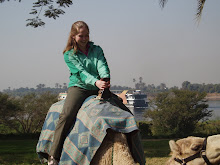

We rode the ferry last night from Crete back to Athens. Thankfully, nobody got sick this time! The ferry docks early, at around 6:00 am, so our day was long. First we saw the site of the burial of the Athenians from the Battle of Marathon in 490 B.C. There is a huge burial mound at this site, and it is enclosed by a fence that we could not enter. The Battle of Marathon is listed as one of the most decisive battles in history. The Persians invaded the Athenian plain, and in a shocking victory 192 Athenians died against 6500 Persians deaths. This battle was decisive not because it ended the Persian War but because before this battle, nobody could stand up to the Persians. Dr. Krentz is writing a book on the Battle of Marathon that should be published in Spring, 2010. I look forward to reading it (and obtaining his signature) after hearing so much from him.
We also saw the trope, which was the site where the Persians turned and fled the battle site. A trophy was erected above a large column, and this column was reconstructed for the 2004 Summer Olympics in Athens. We saw the trophy itself at the Museum of Marathon.
On Thursday, January 29th, we visited Eretria, Lefkandi, and Thebes. We first saw the remains of a house in Lefkandi from the Dark Ages. It was an intriguing site, and very little is known about the use of the site and likely builders. In Eretria, we saw the remains of a Greek city, and we visited the Eretrian Museum. Eretria is a Swiss excavation site, and Sylvian Fachard, the head of the Swiss School of Archaeology at Eretria gave us a tour of the museum, sites and acropolis. Sylvian was an excellent guide and a remarkable character. I found his family background especially interesting. He was born in New York and raised in Switzerland, and his mother is Greek. He speaks French, Italian, English and Greek and seemed like an all-round brilliant guy. He joined us for lunch, and I learned a lot by hearing from an active archaeologist. In particular, we learned about all of the paperwork and endless bureaucracy involved in starting a dig. Similar to problems of eminent domain in the U.S., a school must buy a property before digging it, and this often involves forcing a family to sell their home.
We also saw the House of the Mosaics in Eretria. This house, built in 370 B.C. and destroyed by fire in 270 B.C., was probably the residence of a very wealthy family. It has been dubbed “House of the Mosaics” for its beautiful and intricate floor mosaics.
I really enjoyed this meal at a taverna in Eretria with Sylvian. The meal was delicious, and I had pasticcio, a Greek pasta dish. In addition to being able to talk with Sylvian, I got to see a whole other side of Spiros. He does not usually eat with the group, but when he does he does not talk because he only speaks Greek. Well, Spiros sat next to Sylvian, and they had quite the conversation which Sylvian translated for us. The breakfast that morning at our hotel in Thebes was sub-par. Everywhere we have stayed this trip has had complementary breakfasts, and the range in quality has been vast. Thebes was the worst, and even I, and I proudly consider myself not picky, did not enjoy it. We could tell that Spiros was very passionate about whatever he was talking to Sylvian about, and he was using many dramatic hand gestures. He apparently told Sylvian that the breakfast was so bad he wanted to throw it in the hotel staff’s face! He also complained about the elevators which were, it is true, almost too small for one person. But by my estimations the hotel in Thebes was the best we have been to because it had free wireless! I don’t know if I should write this, but the password was wonderful – 1234567890.
On Friday, we visited the site of the Battle of Chaironeia, which occurred in 338 B.C. Philip II, king of the Macedonians, and his son Alexander, defeated the Greeks. This was a decisive battle because it was the end of the free Greek poleis. We then continued the drive into Delphi. More than any of the other Greek towns we have stayed in, Delphi is a vacation spot. It is under and between beautiful snow-covered mountains and is therefore a popular ski resort. Our hotel experience in Delphi was also interesting. It was filled with Greek high school students, and they were LOUD and frisky. We received several prank phone calls during the evening and early morning, and they all came back from the clubs at 5:00 am. This return must have awoken the entire hotel, and Dr. Krentz was not happy the next morning.












